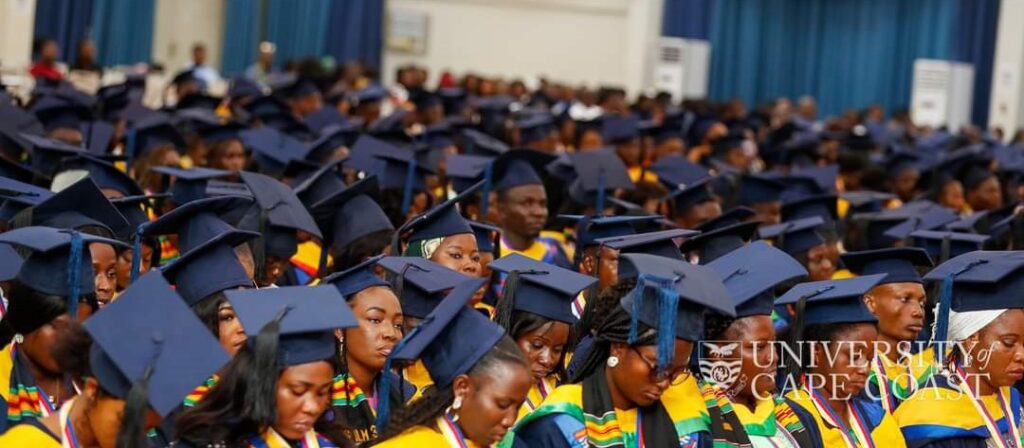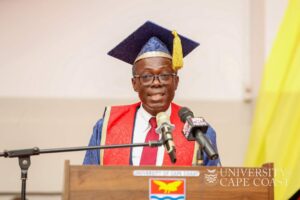UCC graduates 9,106 students at 56th Congregation
 The University of Cape Coast (UCC) has held the final five sessions of its 56th congression, which saw a total of 9,106 students graduating.
The University of Cape Coast (UCC) has held the final five sessions of its 56th congression, which saw a total of 9,106 students graduating.
Out of the number, 6,040 students graduated from the College of Distance Education (CoDE), with 174 obtaining First Class.
Miss Eyra Arnong emerged the Overall Best Graduating Student with a Cummulative Grade Point Average of 3.9104. She was awarded a laptop, cash prize, a plaque and scholarship for a Master’s programme.
From the Institute of Education of the College of Education Studies, 1,868 students, who pursued five-semester programmes in Education, graduated with 283 obtaining First Class.
Ernest Lucien-Marc was adjudged the Overall Best Student with Cummulative Grade Point Average of 3.941 and awarded a laptop, an undisclosed cash prize and a plaque.
There were 1,198 graduands from the School of Graduate Studies, comprising 19 Doctors of Philosophy (PhD), 51 Masters of Philosophy (MPhil), nine Masters of Commerce, four Masters of Nursing, and 575 Masters of Education.
The rest were 59 Masters of Business Administration (MBA), four Master’s of Science (MSc), 121 Masters of Arts (MA), 12 Postgraduate Diplomas in Education and 344 Postgraduate Diplomas in Security Studies.
Professor Johnson Nyarko Boampong, Vice Chancellor of UCC, congratulated the graduands and entreated them to be innovative to create jobs for themselves instead of depending on government for employment.
The University’s curricula had been enriched with 21st Century skills and competencies, therefore, he expressed the conviction that the graduates would apply the knowledge acquired for society’s good.
“Our tailor-made programmes are designed to add value to all who go through our teaching and learning process,” he said.
“Our training activities tend to make our clients competitively relevant at each point in time and hence, make our students more qualified to compete in the job market.”
Prof Boampong reiterated management’s commitment to making UCC a centre of excellence, assuring continuous policy initiatives and strategies to achieve that feat.
Notable among them are the numerous infrastructural projects, establishing partnerships and introducing new

programmes to improve teaching and learning outcomes.
He mentioned the multipurpose College of Health Allied Sciences complex, the first phase of which was likely to be completed and commissioned later in the year, as one such project to facilitate teaching and learning.
“The science annex building, which started 15 years ago, has now been completed awaiting commissioning,” he said.
The Vice Chancellor highlighted some activities undertaken by CoDE, including resource and study centres at Agona Nyakrom and Dominase.
“The College will work hard to obtain premise and programme accreditation for Dominase and Accra study centres for regular and distant programme from the 2024/2025 academic year.”
The College was also developing curricula for short courses to augment its traditional and regular programmes.
“Documentation of these programmes and courses have been submitted to the sub-committee of the Academic Board for consideration,” he announced.
Prof Boampong bemoaned some challenges affecting the College, which required creative thinking and innovation to resolve.
He said the new directives from the Ghana Tertiary Education Commission (GTEC) to the colleges of distance education to move their learning centres from the senior high schools to tertiary institutions posed a great challenge to the University.
“The College is now saddled with the responsibility of looking for tertiary institutions nationwide to house our distant learners and this has been very difficult because most institutions are unwilling to accept our students on their campuses,” he said.
Source: GNA
